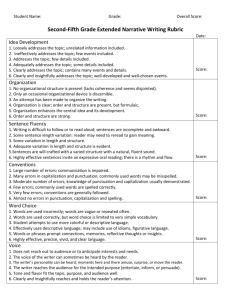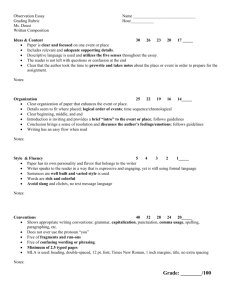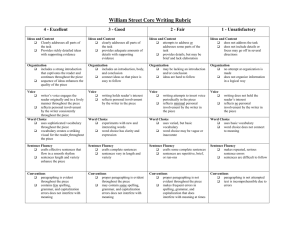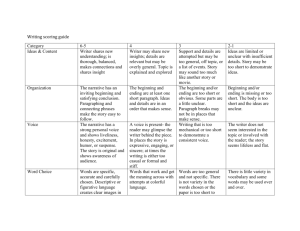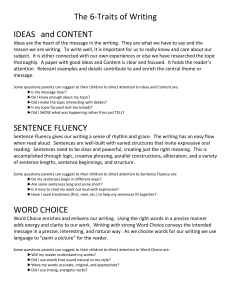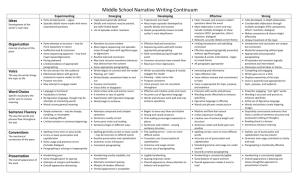Word Choice
advertisement
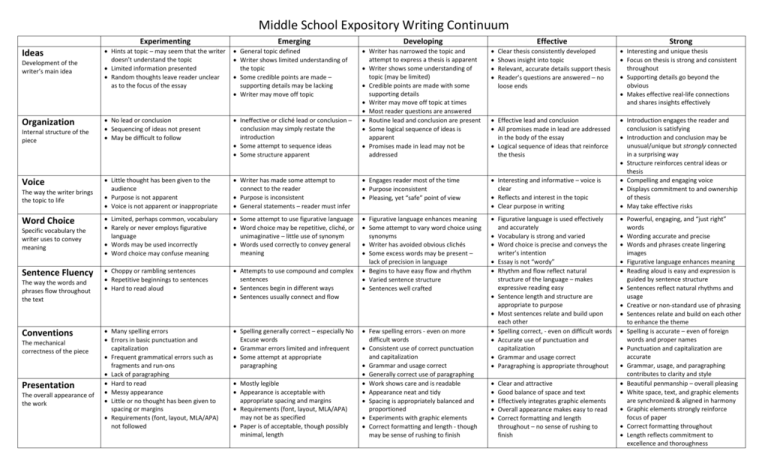
Middle School Expository Writing Continuum Experimenting Ideas Development of the writer’s main idea Organization Internal structure of the piece Voice The way the writer brings the topic to life Word Choice Specific vocabulary the writer uses to convey meaning Sentence Fluency The way the words and phrases flow throughout the text Conventions The mechanical correctness of the piece Presentation The overall appearance of the work Emerging Hints at topic – may seem that the writer doesn’t understand the topic Limited information presented Random thoughts leave reader unclear as to the focus of the essay General topic defined Writer shows limited understanding of the topic Some credible points are made – supporting details may be lacking Writer may move off topic No lead or conclusion Sequencing of ideas not present May be difficult to follow Ineffective or cliché lead or conclusion – conclusion may simply restate the introduction Some attempt to sequence ideas Some structure apparent Little thought has been given to the audience Purpose is not apparent Voice is not apparent or inappropriate Developing Effective Writer has narrowed the topic and attempt to express a thesis is apparent Writer shows some understanding of topic (may be limited) Credible points are made with some supporting details Writer may move off topic at times Most reader questions are answered Routine lead and conclusion are present Some logical sequence of ideas is apparent Promises made in lead may not be addressed Writer has made some attempt to connect to the reader Purpose is inconsistent General statements – reader must infer Engages reader most of the time Purpose inconsistent Pleasing, yet “safe” point of view Interesting and informative – voice is clear Reflects and interest in the topic Clear purpose in writing Limited, perhaps common, vocabulary Rarely or never employs figurative language Words may be used incorrectly Word choice may confuse meaning Some attempt to use figurative language Word choice may be repetitive, cliché, or unimaginative – little use of synonym Words used correctly to convey general meaning Choppy or rambling sentences Repetitive beginnings to sentences Hard to read aloud Attempts to use compound and complex sentences Sentences begin in different ways Sentences usually connect and flow Figurative language enhances meaning Some attempt to vary word choice using synonyms Writer has avoided obvious clichés Some excess words may be present – lack of precision in language Begins to have easy flow and rhythm Varied sentence structure Sentences well crafted Many spelling errors Errors in basic punctuation and capitalization Frequent grammatical errors such as fragments and run-ons Lack of paragraphing Hard to read Messy appearance Little or no thought has been given to spacing or margins Requirements (font, layout, MLA/APA) not followed Spelling generally correct – especially No Excuse words Grammar errors limited and infrequent Some attempt at appropriate paragraphing Figurative language is used effectively and accurately Vocabulary is strong and varied Word choice is precise and conveys the writer’s intention Essay is not “wordy” Rhythm and flow reflect natural structure of the language – makes expressive reading easy Sentence length and structure are appropriate to purpose Most sentences relate and build upon each other Spelling correct, - even on difficult words Accurate use of punctuation and capitalization Grammar and usage correct Paragraphing is appropriate throughout Mostly legible Appearance is acceptable with appropriate spacing and margins Requirements (font, layout, MLA/APA) may not be as specified Paper is of acceptable, though possibly minimal, length Few spelling errors - even on more difficult words Consistent use of correct punctuation and capitalization Grammar and usage correct Generally correct use of paragraphing Work shows care and is readable Appearance neat and tidy Spacing is appropriately balanced and proportioned Experiments with graphic elements Correct formatting and length - though may be sense of rushing to finish Strong Clear thesis consistently developed Shows insight into topic Relevant, accurate details support thesis Reader’s questions are answered – no loose ends Interesting and unique thesis Focus on thesis is strong and consistent throughout Supporting details go beyond the obvious Makes effective real-life connections and shares insights effectively Effective lead and conclusion All promises made in lead are addressed in the body of the essay Logical sequence of ideas that reinforce the thesis Introduction engages the reader and conclusion is satisfying Introduction and conclusion may be unusual/unique but strongly connected in a surprising way Structure reinforces central ideas or thesis Compelling and engaging voice Displays commitment to and ownership of thesis May take effective risks Clear and attractive Good balance of space and text Effectively integrates graphic elements Overall appearance makes easy to read Correct formatting and length throughout – no sense of rushing to finish Powerful, engaging, and “just right” words Wording accurate and precise Words and phrases create lingering images Figurative language enhances meaning Reading aloud is easy and expression is guided by sentence structure Sentences reflect natural rhythms and usage Creative or non-standard use of phrasing Sentences relate and build on each other to enhance the theme Spelling is accurate – even of foreign words and proper names Punctuation and capitalization are accurate Grammar, usage, and paragraphing contributes to clarity and style Beautiful penmanship – overall pleasing White space, text, and graphic elements are synchronized & aligned in harmony Graphic elements strongly reinforce focus of paper Correct formatting throughout Length reflects commitment to excellence and thoroughness

